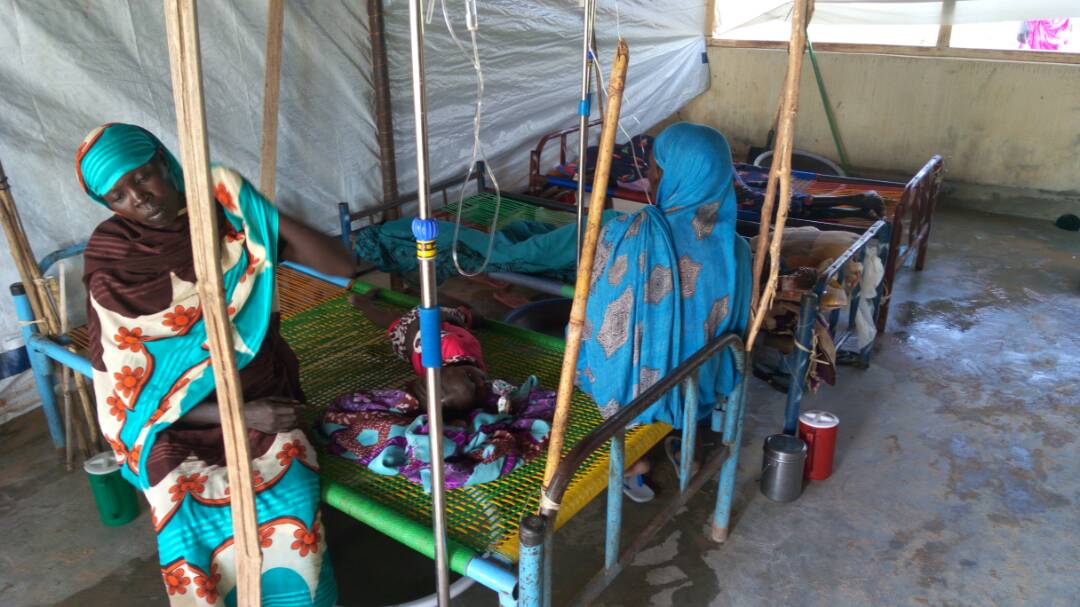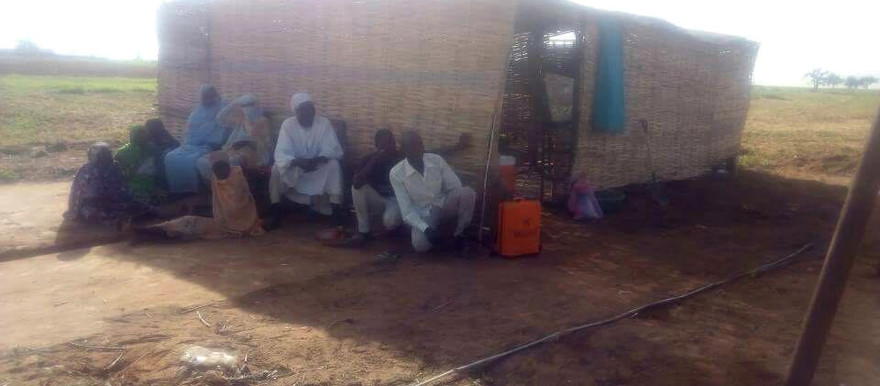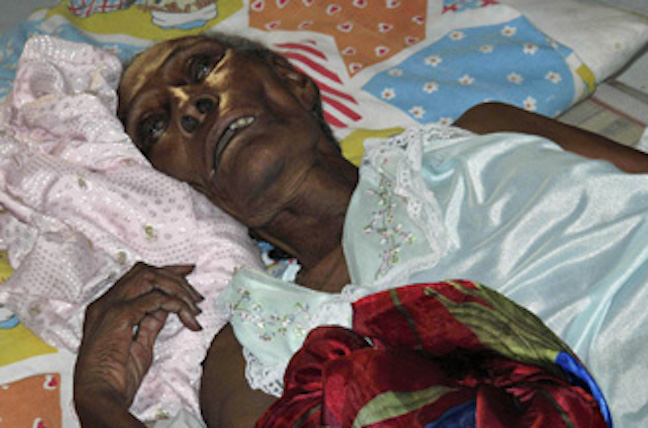Update on Cholera in Darfur and Sudan Generally
Eric Reeves | September 6, 2017 | http://wp.me/p45rOG-26g
For several months now I have “Tweeted” (@SudanReeves) regularly about the cholera epidemic as it has spread to Darfur (#CholeraInSudan or #Cholera_In_Sudan). Occasionally I have posted longer discussions of the disease crisis, which continues to be labeled as “Acute Watery Diarrhea” at Khartoum’s insistence. The regime fears the stigma of using the accurate term, and the National Intelligence and Security Services (NISS) have regularly warned journalists and medical officials not to use the word “cholera.” One journalist has been arrested for defying the ban, and one senior hospital official in Khartoum was removed from his position for declaring that the disease is in fact “cholera.”
Cholera isolation ward in Kalma camp, South Darfur
Khartoum’s insistence on the finally euphemistically general term “Acute Watery Diarrhea” has extended to the international community as well: no UN agency has defied Khartoum’s description, even as the evidence of cholera is abundant, including laboratory tests conducted in Sudan. Scandalously, the UN’s World Health Organization and Office for the Coordination of Humanitarian Affairs have both knuckled under to Khartoum’s pressure. In turn, International Nongovernmental Humanitarian Organization (INGOs) are silenced by the UN’s refusal to speak the truth about cholera in Sudan: any organization using the word would be promptly expelled if it made the decision to speak out, given UN silence. The U.S. Agency for International Development (USAID) has been similarly silent on the realities of the cholera epidemic that has been sweeping across Sudan for over a year.
Cholera center in West Darfur
What should be fully noted is that this is clearly a political decision, not a matter of medical uncertainty. In addition to the massive evidence of cholera at hand, we know that if the UN’s World Health Organization were to test fecal samples from victims of the disease now rampant in virtually all Sudanese states, using their laboratories in Geneva, confirmation of the nature of the disease could be made in extremely short order. The Director General of UN WHO, Dr. Tedros Adhanom Ghebreyesus, has refused to make this confirmation. As a direct result, there are immense shortcomings in medical resources and re-hydration supplies (crucial to the treatment of cholera)—and there are no cholera disease specialists, including physicians and epidemiologists.
Amidst this lack of an urgent response to a major medical crisis in Sudan, the Sudanese people continue to suffer and die.
Cholera victim in Darfur
In the past week Radio Dabanga has reported:
• 13 cholera dead in South Darfur capital | Radio Dabanga, September 5, 2017 | NYALA / KASS / KALMA / GARSILA / NIERTETI / FORO BARANGA | https://www.dabangasudan.org/en/all-news/article/13-cholera-dead-in-south-darfur-capital
Thirteen people died of cholera in a district of Nyala, medical sources reported on Sunday. One of the nearby camps for displaced people is treating “dozens of infected people.” The medics and medical volunteers in Nyala, the capital of South Darfur, reported the deaths of 13 people and the infection of 91 people in El Wehda district in the southern part of the city. There are other casualties which have not been counted yet in El Fiteihad, Kararai, and Khartoum Bileil districts in Nyala. “The situation in Nyala is out of control and poses dangers to the residents.” A sheikh in El Salam camp for displaced people, south of Nyala, told Radio Dabanga that two people died of cholera, and five others were infected on Saturday. “We are concerned that the rate of cholera infections will increase because of the lack of health education and life-saving medicines, amid the continued rains.”
Otash, Kalma camps
Two people died in Otash camp in Nyala, South Darfur, on Monday. One of the camp sheikhs told Radio Dabanga yesterday that dozens of people were being treated in the isolation centre of Block 3 in the camp. “The parts of the camp which are affected the most are Blocks 1, 8 and 9.” Activists who volunteer in the campaign against cholera reported the death of four people in Kass in South Darfur on Saturday. There are ten new cases of cholera, four of them from Kass town, and 6 other from villages near Kass on Saturday.
Seven residents of Kalma camp for displaced people were infected with cholera, while 79 other displaced people contracted the disease from Friday until Sunday, the secretary-general of Kalma, Saleh Eisa told Radio Dabanga. “The number of hospitalised cases in the two health centres here amounted to 35 until Sunday.”
Central Darfur
In Garsila locality in Central Darfur, six people died on Sunday. Three people were infected and taken to Garsila hospital, sources informed Radio Dabanga. Earlier this week it was reported that cholera victims from Bindisi also were being transferred to Garsila hospital.
Nierteti hospital in Central Darfur received seven new cholera cases in its isolation centre on Saturday and Sunday. One of the camp elders in Nierteti locality informed Radio Dabanga that two of the cases came from neighbouring villages of Nierteti on Saturday. “On Monday, the centre also received three cases coming from neighbouring villages and from inside the town. The total number of hospitalised cases in the centre has been nine, until Monday.” One person died in Anjoucti in West Darfur where six others were infected and taken to Foro Baranga hospital.
‘Acute watery diarrhoea’
The National Epidemiological Corporation reported in July that nearly 24,000 Sudanese have been infected and 940 cholera patients have died since the outbreak of the infectious disease in Blue Nile state in August last year. The Sudanese authorities however, refuse to call the disease by its name, and refer to it as “Watery Diarrhoea.” The National Intelligence and Security Service has repeatedly warned medics and the press in the country not to make mention of cholera. Cholera “seems to be a stigma for the government,” a Sudanese specialist told Radio Dabanga in January.
• Cholera still haunts Darfur | Radio Dabanga, September 3, 2017 | MURNEI / ZALINGEI / NIERTETI | https://www.dabangasudan.org/en/all-news/article/cholera-still-haunts-darfur
New cases of cholera are being reported daily across Darfur, but medics in Nierteti are cautiously optimistic with a drop in cases this week.
[Sadly, a drop in cases for a week in one location suggests, statistically, almost nothing about the growing spread of the cholera epidemic in Darfur and Sudan more broadly; the dispatch above this one from Radio Dabanga makes clear that this amounts to little more than hopeful thinking—ER]
In addition to the spread of malaria following heavy rains, six people died of cholera and 19 new infection cases of were reported at camp Murnei in West Darfur from Wednesday to Friday. A camp Sheikh told Radio Dabanga that the total number of hospitalised cases at camp Murnei were 22 until Friday.
Zalingei
The isolation centre at Zalingei Hospital in Central Darfur recorded six deaths and 19 new cases on Thursday and Friday. El Shafee Abdallah, the Coordinator of Central Darfur camps told Radio Dabanga that camp Hamidiya recorded four deaths and five new infection cases on Thursday and Friday, each of camp El Hassahissa and Khamsa Degaig recorded 10 new cases on Thursday and Friday, while the neighbouring villages of Zalingei recorded two deaths and four new infection cases, bringing the number of hospitalised cases to 72 until Friday.
Nierteti
At Nierteti Hospital in Central Darfur, cholera cases remarkably dropped at the isolation centre on Friday. One of the sheikhs told Radio Dabanga that on Friday Nierteti Hospital isolation centre recorded only one case coming from outside of Nierteti. He pointed out that the hospitalised cases have dropped down to seven until Friday.
• Cholera: Five dead in Central Darfur camp | Radio Dabanga, September 1, 2017 | BINDISI / NIERTETI / ZAMZAM | https://www.dabangasudan.org/en/all-news/article/cholera-five-dead-in-central-darfur-camp
Five people, including three children, have succumbed to cholera in a camp for displaced people in Bindisi, Central Darfur, since Sunday. 45 others have been infected in the camp, one of the sheikhs told Radio Dabanga. Bindisi hospital recorded three new cases of cholera on Thursday, bringing the number of patients hospitalised to seven. “Cholera cases have increased in the camp over the past two weeks,” he said. A number of patients have been transferred to Zalingei and Garsila hospitals because of the poor health care in Bindisi Hospital. The isolation centre of Nierteti hospital in Central Darfur recorded three cases of cholera on Wednesday and Thursday. One of the camp Sheikhs told Radio Dabanga that the centre received two cases from villages near Nierteti on Wednesday, while the centre received one case from Nierteti camps. “The number of hospitalised cases at the cholera isolation centre in Nierteti hospital amounted to 12 on Thursday.”
Yesterday Radio Dabanga reported that the medical isolation centre at Zalingei Royal Hospital in Central Darfur recorded 16 new cases of cholera on Tuesday. In Zamzam camp for the displaced, south of El Fasher, two people died of cholera and three others were infected on Tuesday and Thursday. A camp sheikh told Radio Dabanga that on Tuesday the centre recorded one death and two new cases on Thursday morning. There currently are four hospitalised cases.
‘Drop in cases’
On Wednesday activists reported to Radio Dabanga that there has been a drop in cholera cases and deaths in Kass of South Darfur and El Sareif Beni Hussein in North Darfur.
[Again, sadly, a drop in cases for a week in one or two locations suggests, statistically, almost nothing about the growing spread of the cholera epidemic in Darfur and Sudan more broadly; the dispatch above this one from Radio Dabanga makes clear that this amounts to little more than hopeful thinking—ER]
• Cholera deaths, new infections within South Darfur families | Radio Dabanga, August 31, 2017 | KALMA / KASS / SENNAR / EAST JEBEL MARRA | https://www.dabangasudan.org/en/all-news/article/cholera-deaths-new-infections-within-south-darfur-families
The cholera epidemic continues to claim victims across Darfur and Sudan. A young woman from El Salam camp in Kass locality was discharged prematurely, died at home, but infected her mother. The cholera health centres at Kalma camp for the displaced in South Darfur received 22 new cases of cholera on Wednesday. Yagoub Furi, the general coordinator of displaced persons and refugee camps, told Radio Dabanga that the 22 new cases are in addition to the existence of 41 old cases of cholera in the two centres receiving treatment. Furi appealed to the government to declare the cholera epidemic because of the seriousness of the situation in the displaced camps in Darfur and its villages.
Kass
On Wednesday morning a woman died of cholera at camp El Salam in Kass in South Darfur, while five women and two men are being treated in the isolation centre at Kass Hospital. One of the sheikhs told Radio Dabanga that the deceased, aged 21, was discharged from Kass Hospital on Monday but died after her health deteriorated yesterday morning. He pointed out that yesterday morning her mother was infected with the same disease and was transferred after the end of the funeral to Kass Hospital. He pointed to the lack of medicines and intravenous solutions in the hospital with the steady rise in rates of infection and death. He called on the organisations and the Ministry of Health to expedite the provision of medicines and intravenous solutions.
Sennar
Singa Hospital in Sennar received five new cases of cholera on Tuesday and Wednesday.
On Saturday a medical source told Radio Dabanga that the city hospital received four new on Wednesday and one case on Tuesday. He said two cases were from Bir Ambali area of El Souki locality and three from El Salam area of Singa city, this along with two remaining cases that entered the hospital last week.
East Jebel Marra
The Member of Parliament for East Jebel Marra in South Darfur, Mohamed Ali Abdelrahman, revealed the death and infection of hundreds with ‘watery diarrhoea’ in East Jebel Marra. He warned of the worsening health situation in the locality, especially amid the lack of clean drinking water. He said that people drink from the reservoirs and the health staff are inadequate and untrained to cover the cases. He stressed the lack of medicines and intravenous solutions for the epidemic which force them to transfer the patients to North Darfur, causing the death of a number of them during the transfer for treatment. He said that schools in East Jebel Marra have become a shelter for men and women who sleep on the ground. He confirmed the spread of the disease in the localities of El Wehda, Mershing, East Jebel Marra.
• West Darfur camp records six cholera deaths | Radio Dabanga, September 4, 2017 | MURNEI / ZALINGEI / ABTA / EL ROSEIRES | https://www.dabangasudan.org/en/all-news/article/west-darfur-camp-records-six-cholera-deaths
Murnei camp in West Darfur recorded six deaths over the last days, and 13 new cases of cholera. Isolation wards in Central Darfur recorded three deaths over the weekend, and reports re-emerged from El Roseires locality in Blue Nile. A sheikh in Murnei camp for displaced people told Radio Dabanga that by Sunday, a total of 22 patients were admitted to the camp’s isolation ward. From Sunday 27 August until last Thursday, 17 people reportedly succumbed to cholera. In Zamzam camp, south of El Fasher city, four new cases of cholera were recorded on Friday and Saturday. A camp elder told this station that the isolation ward was closed on the first day of Eid Al Adha, “because of the absence of medical personnel, so the four new patients had to be transferred to El Fasher for treatment.”
Central Darfur
Isolation centres in Zalingei and Abta village, Central Darfur, recorded three deaths and 37 new infection cases from Friday until Sunday, according to the coordinator of camps in the state, El Shafee Abdallah. In Hamidiya camp, three cholera patients died and 13 people infected with cholera reported to the isolation centre. Meanwhile in the last three days, the Hassahissa, Khamsa Degaig and Teiba camps recorded 17 new cases. The total number of hospitalised cholera cases in the Zalingei Royal Hospital amounted to 76 people as of Sunday. “From Friday to Sunday, the isolation centre in Abta village near Zalingei recorded seven new cases. The people are from Abta, Tiri, Dirlo and Kalgo,” El Shafee said.
Blue Nile
In Blue Nile state, two people died from cholera and 31 people contracted the disease in the localities Ed Damazin and El Roseires in the last week. A medical source in the area told Radio Dabanga that the Royal Hospital in Ed Damazin received four cholera cases of cholera, from Arquette North. “Two of them died on Wednesday.” Another medical source reported that last week, the hospital received 25 cases of cholera from different parts of El Roseires. Four cases were recorded in Gisan locality.
“El Roseires locality recorded the highest number of casualties of all localities in Blue Nile. There is a severe neglect of the number of staff in the isolation wards, because were off spending their Eid Al Adha holiday.” Blue Nile was the first state to report cases of cholera in September 2016, or ‘acute watery diarrhoea’ as the Sudanese government has referred to it since the start of the cholera outbreak. A UK-based Sudanese specialist told Radio Dabanga in January that cholera “seems to be a stigma for the government.”
Contagious
Cholera is a fast-developing, highly contagious infection that can spread in areas short of clean drinking water and with poor sanitation. Since the first reports of cholera from Blue Nile in September last year, the disease spread in eastern Sudan, and later to the Northern State and central Sudan’s El Gezira. The disease has also spread to North Kordofan, and fully hit Khartoum in May, the UN Office for the Coordination of Humanitarian Affairs (OCHA) in Sudan said in June. That month, the first cases of cholera in East Darfur appeared in a South Sudanese refugee camp. Within a week, the first reports of the spread of cholera in North Darfur were accompanied by reports of infections in South Darfur (Kalma camp) and East Darfur.


